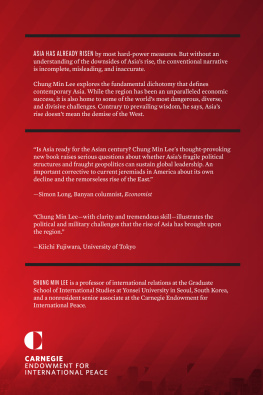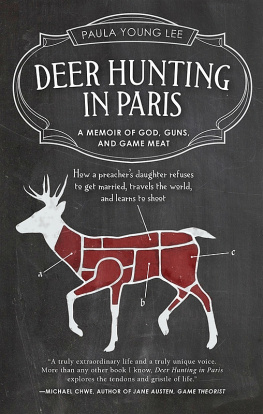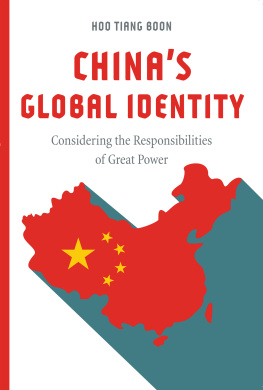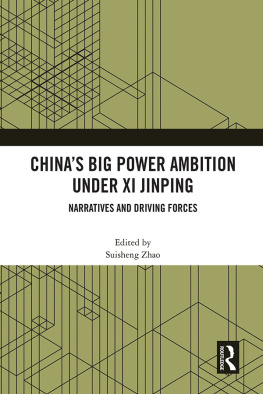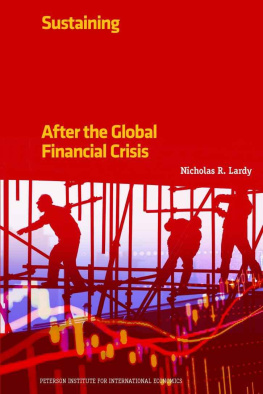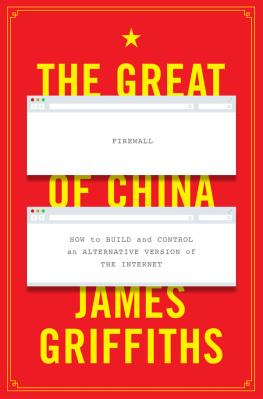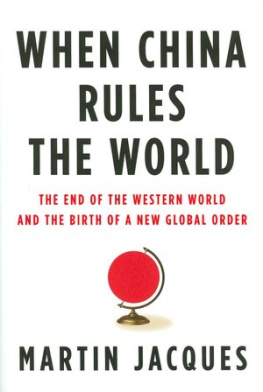Lee - AI Superpowers: China, Silicon Valley, and the New World Order
Here you can read online Lee - AI Superpowers: China, Silicon Valley, and the New World Order full text of the book (entire story) in english for free. Download pdf and epub, get meaning, cover and reviews about this ebook. City: China;United States, year: 2018, publisher: Houghton Mifflin Harcourt, genre: Romance novel. Description of the work, (preface) as well as reviews are available. Best literature library LitArk.com created for fans of good reading and offers a wide selection of genres:
Romance novel
Science fiction
Adventure
Detective
Science
History
Home and family
Prose
Art
Politics
Computer
Non-fiction
Religion
Business
Children
Humor
Choose a favorite category and find really read worthwhile books. Enjoy immersion in the world of imagination, feel the emotions of the characters or learn something new for yourself, make an fascinating discovery.
- Book:AI Superpowers: China, Silicon Valley, and the New World Order
- Author:
- Publisher:Houghton Mifflin Harcourt
- Genre:
- Year:2018
- City:China;United States
- Rating:4 / 5
- Favourites:Add to favourites
- Your mark:
- 80
- 1
- 2
- 3
- 4
- 5
AI Superpowers: China, Silicon Valley, and the New World Order: summary, description and annotation
We offer to read an annotation, description, summary or preface (depends on what the author of the book "AI Superpowers: China, Silicon Valley, and the New World Order" wrote himself). If you haven't found the necessary information about the book — write in the comments, we will try to find it.
Lee: author's other books
Who wrote AI Superpowers: China, Silicon Valley, and the New World Order? Find out the surname, the name of the author of the book and a list of all author's works by series.
AI Superpowers: China, Silicon Valley, and the New World Order — read online for free the complete book (whole text) full work
Below is the text of the book, divided by pages. System saving the place of the last page read, allows you to conveniently read the book "AI Superpowers: China, Silicon Valley, and the New World Order" online for free, without having to search again every time where you left off. Put a bookmark, and you can go to the page where you finished reading at any time.
Font size:
Interval:
Bookmark:

Copyright 2018 by Kai-Fu Lee
All rights reserved
For information about permission to reproduce selections from this book, write to or to Permissions, Houghton Mifflin Harcourt Publishing Company, 3 Park Avenue, 19th Floor, New York, New York 10016.
hmhco.com
Library of Congress Cataloging-in-Publication Data
Names: Lee, Kai-Fu, author.
Title: AI superpowers : China, Silicon Valley, and the new world order /Kai-Fu Lee.
Description: Boston : Houghton Mifflin Harcourt, [2018] | Includes bibliographical references and index. Identifiers: LCCN 2018017250 (print) | LCCN 2018019409 (ebook) | ISBN 9781328545862 (ebook) | ISBN 9781328546395 (hardcover)
ISBN 9781328606099 (international edition)Subjects: LCSH : Artificial intelligenceEconomic aspectsChina. | Artificial intelligenceEconomic aspectsUnited States.
Classification: LCC HC 79.I55 (ebook) | LCC HC 79.I55 L 435 2018 (print) | DDC 338.4/700630951 DC 23
LC record available at https://lccn.loc.gov/2018017250
Cover design by Mark R. Robinson
Author photograph Huili Shi
v1.0818
To Raj Reddy, my mentor in AI and in life
IntroductionOne of the obligations that comes with my work as a venture-capital (VC) investor is that I often give speeches about artificial intelligence (AI) to members of the global business and political elite. One of the joys of my work is that I sometimes get to talk about that very same topic with kindergarteners. Surprisingly, these two distinctly different audiences often ask me the same kinds of questions. During a recent visit to a Beijing kindergarten, a gaggle of five-year-olds grilled me about our AI future.
Are we going to have robot teachers?
What if one robot car bumps into another robot car and then we get hurt?
Will people marry robots and have babies with them?
Are computers going to become so smart that they can boss us around?
If robots do everything, then what are we going to do?
These kindergarteners questions echoed queries posed by some of the worlds most powerful people, and the interaction was revealing in several ways. First, it spoke to how AI has leapt to the forefront of our minds. Just a few years ago, artificial intelligence was a field that lived primarily in academic research labs and science-fiction films. The average person may have had some sense that AI was about building robots that could think like people, but there was almost no connection between that prospect and our everyday lives.
Today all of that has changed. Articles on the latest AI innovations blanket the pages of our newspapers. Business conferences on leveraging AI to boost profits are happening nearly every day. And governments around the world are releasing their own national plans for harnessing the technology. AI is suddenly at the center of public discourse, and for good reason.
Major theoretical breakthroughs in AI have finally yielded practical applications that are poised to change our lives. AI already powers many of our favorite apps and websites, and in the coming years AI will be driving our cars, managing our portfolios, manufacturing much of what we buy, and potentially putting us out of our jobs. These uses are full of both promise and potential peril, and we must prepare ourselves for both.
My dialogue with the kindergartners was also revealing because of where it took place. Not long ago, China lagged years, if not decades, behind the United States in artificial intelligence. But over the past three years China has caught AI fever, experiencing a surge of excitement about the field that dwarfs even what we see in the rest of the world. Enthusiasm about AI has spilled over from the technology and business communities into government policymaking, and it has trickled all the way down to kindergarten classrooms in Beijing.
This broad-based support for the field has both reflected and fed into Chinas growing strength in the field. Chinese AI companies and researchers have already made up enormous ground on their American counterparts, experimenting with innovative algorithms and business models that promise to revolutionize Chinas economy. Together, these businesses and scholars have turned China into a bona fide AI superpower, the only true national counterweight to the United States in this emerging technology. How these two countries choose to compete and cooperate in AI will have dramatic implications for global economics and governance.
Finally, during my back-and-forth with those young students, I stumbled on a deeper truth: when it comes to understanding our AI future, were all like those kindergartners. Were all full of questions without answers, trying to peer into the future with a mixture of childlike wonder and grown-up worries. We want to know what AI automation will mean for our jobs and for our sense of purpose. We want to know which people and countries will benefit from this tremendous technology. We wonder whether AI can vault us to lives of material abundance, and whether there is space for humanity in a world run by intelligent machines.
No one has a crystal ball that can reveal the answers to these questions for us. But that core uncertainty makes it all the more important that we ask these questions and, to the best of our abilities, explore the answers. This book is my attempt to do that. Im no oracle who can perfectly predict our AI future, but in exploring these questions I can bring my experience as an AI researcher, technology executive, and now venture-capital investor in both China and the United States. My hope is that this book sheds some light on how we got here, and also inspires new conversations about where we go from here.
Part of why predicting the ending to our AI story is so difficult is because this isnt just a story about machines. Its also a story about human beings, people with free will that allows them to make their own choices and to shape their own destinies. Our AI future will be created by us, and it will reflect the choices we make and the actions we take. In that process, I hope we will look deep within ourselves and to each other for the values and wisdom that can guide us.
In that spirit, let us begin this exploration.
Chinas Sputnik MomentThe Chinese teenager with the square-rimmed glasses seemed an unlikely hero to make humanitys last stand. Dressed in a black suit, white shirt, and black tie, Ke Jie slumped in his seat, rubbing his temples and puzzling over the problem in front of him. Normally filled with a confidence that bordered on cockiness, the nineteen-year-old squirmed in his leather chair. Change the venue and he could be just another prep-school kid agonizing over an insurmountable geometry proof.
But on this May afternoon in 2017, he was locked in an all-out struggle against one of the worlds most intelligent machines, AlphaGo, a powerhouse of artificial intelligence backed by arguably the worlds top technology company: Google. The battlefield was a nineteen-by-nineteen lined board populated by little black and white stonesthe raw materials of the deceptively complex game of Go. During game play, two players alternate placing stones on the board, attempting to encircle the opponents stones. No human on Earth could do this better than Ke Jie, but today he was pitted against a Go player on a level that no one had ever seen before.
Believed to have been invented more than 2,500 years ago, Gos history extends further into the past than any board game still played today. In ancient China, Go represented one of the four art forms any Chinese scholar was expected to master. The game was believed to imbue its players with a Zen-like intellectual refinement and wisdom. Where games like Western chess were crudely tactical, the game of Go is based on patient positioning and slow encirclement, which made it into an art form, a state of mind.
Font size:
Interval:
Bookmark:
Similar books «AI Superpowers: China, Silicon Valley, and the New World Order»
Look at similar books to AI Superpowers: China, Silicon Valley, and the New World Order. We have selected literature similar in name and meaning in the hope of providing readers with more options to find new, interesting, not yet read works.
Discussion, reviews of the book AI Superpowers: China, Silicon Valley, and the New World Order and just readers' own opinions. Leave your comments, write what you think about the work, its meaning or the main characters. Specify what exactly you liked and what you didn't like, and why you think so.



